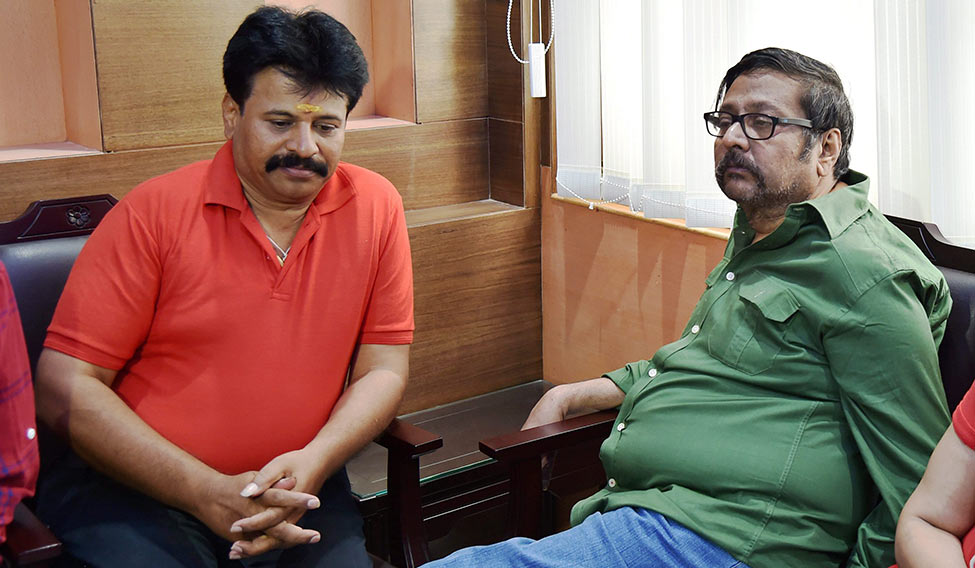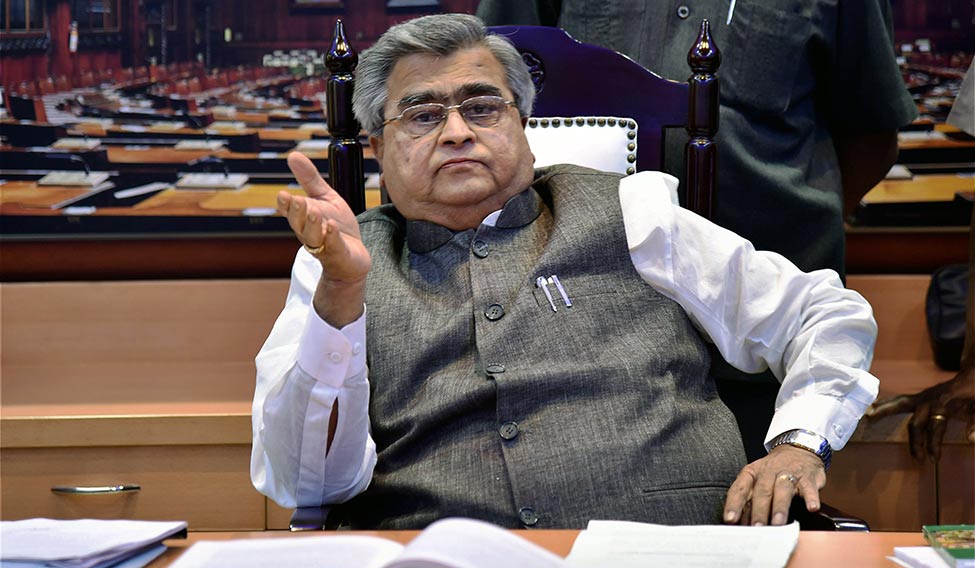In an unprecedented move on June 21, the Karnataka assembly passed a resolution sentencing two Bengaluru journalists to a year in jail over charges of “breach of privilege”. The journalists—Ravi Belagere of Hai Bangalore and Anil Raju of Yelahanka Voice—were accused of publishing reports that “defamed” three legislators. Approving the resolution, Speaker K.B. Koliwad imposed a fine of Rs 10,000 on both Belagere and Raju, failing the payment of which their jail term would be extended by another six months.
The decision provoked a backlash. As media organisations and opposition parties came out against it, the ruling Congress distanced itself from the resolution. K.C. Venugopal, Congress general secretary in charge of Karnataka, said Chief Minister Siddaramaiah would request Koliwad to withdraw the resolution. “The Congress is against harassment of journalists and believes in the freedom of speech,” he said.
A week later, however, the police went to Belagare’s farmhouse at Joida to arrest him. But by then Belagere had been taken to a hospital in Dharwad after he complained of chest pain. Raju was reported “absconding”. Siddaramaiah then directed the police to defer the arrest till Belagare recovered. “I will fight back and appeal before the high court,” said Belagere.
A joint petition filed by him and Raju, however, was dismissed by the Karnataka High Court. Justice Ashok B. Hinchigeri, who heard the petition, advised both the parties to arrive at an “amicable solution”. He also asked the journalists to appear before the speaker, but declined to pass an order restraining the police from arresting them. The judge, however, said the journalists could revive their petition should the need arise.
Two weeks after the resolution was passed, the matter is yet to be resolved. On July 3, Belagere and Raju appeared before Koliwad, after the state government gave an undertaking that they would not be arrested. Their counsel, Shankarappa, petitioned Koliwad to review the punishment, saying the reports that the assembly had perceived to be a breach of privilege were outside the legislature’s ambit. Also, the legislators, he said, did not face any obstacle in discharging their duties. Koliwad accepted the petition, but countered Shankarappa’s contention by reading out portions from Practice and Procedure of Parliament by M.N. Kaul and S.L. Shakdher.
 In the dock: Ravi Belagere (right) and Anil Raju | PTI
In the dock: Ravi Belagere (right) and Anil Raju | PTI
Interestingly, the reports in question were published in September 2014, and Koliwad was one of the three MLAs who had complained to Kagodu Thimmappa, then speaker. Thimmappa had referred the matter to the privileges committee, chaired by former minister Kimmane Rathnakar. Koliwad became speaker in July 2016.
“I have given no report [regarding the matter],” said Koliwad. “It is the report and recommendation of the privileges committee that was unanimously passed by the house. I have ordered the execution of the order. I am only a servant of the house. We will go by the house rules and the law will take its course.”
The issue, however, has brought to focus the powers and privileges of elected representatives and the need for codifying them. The state has witnessed several ‘breach of privilege’ cases where the house reprimanded journalists for ‘defamatory’ articles, but it is for the first time that the house has decided to order the imprisonment of journalists.
Editors Guild of India described the resolution passed by the assembly as “pernicious” and the speaker’s decision to approve it as violation of the fundamental right of freedom of speech. It said the right to try and sentence journalists in defamation cases rests with courts of law. Karnataka assembly, it said, cannot and should not misuse its powers and privileges to sentence any member of the press.
“This privilege, under which the action has been taken, is not even codified,” said a statement issued by the guild. “If individuals of the legislature feel that their reputations have been affected, they are free to take the matter to court against the concerned journalist or the publication…. [They cannot] act as complainant, prosecutor and judge, as they did in this case.”
Interestingly, during the hearing of the petition filed by Belagere and Raju, Justice Hinchigeri asked A.S. Ponnanna, additional advocate general, whether there were any guidelines to determine the quantum of punishment for breach of privilege. He also noted that it was “disdainful disobedience” on the journalists’ part that they had not appeared before the privileges committee despite having been summoned several times. “The editors invited the trouble by staying away from the [privileges committee] proceedings. The fourth estate has all the liberty and freedom, but it should ensure that they do not go below the belt,” said the judge, referring to the use of unparliamentary words in the reports.
S. Suresh Kumar, BJP spokesperson and former law minister, said the hasty manner in which the breach of privilege motion was moved in the house, and the harsh sentencing of the journalists, went against parliamentary decorum. “It raises suspicion that the legislature is intolerant of the media,” he said. “A breach of privilege happens when a member is prevented from discharging his duties. But the matters presented before the house in this case did not qualify as breach of privilege. I have talked to the privileges committee chairman about the need to withdraw the order, as it taints the image of both the legislature and the media.”








